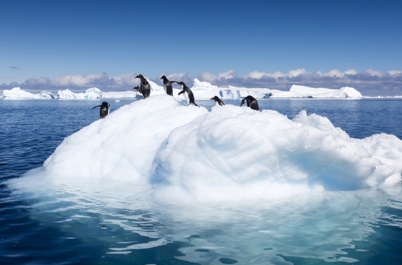万物简史(MP3+中英字幕) 第620期:冰河时代(17)
日期:2019-10-09 09:22
(单词翻译:单击)
What is most alarming is that we have no idea—none—what natural phenomena could so swiftly rattle Earth's thermometer. As Elizabeth Kolbert, writing in the New Yorker, has observed: "No known external force, or even any that has been hypothesized, seems capable of yanking the temperature back and forth as violently, and as often, as these cores have shown to be the case." There seems to be, she adds, "some vast and terrible feedback loop," probably involving the oceans and disruptions of the normal patterns of ocean circulation, but all this is a long way from being understood.
最令人不安的是,我们不知道——报本不知道——是什么自然现象使得地球的温度发生如此快速的变化。就像伊丽莎白·考柏特在《纽约客》上撰文所指出的那样:“没有已知的任何外部力量——甚至没有任何假设的外部力量——使得地球温度发生如冰核所显示的那样剧烈、那样经常的变化。这当中似乎存在一个,”她继续写道,“范围很广而又十分可怕的反馈循环。”这很可能和海洋及洋流的正常循环被打乱有关,但是要彻底了解这一切,我们还有很长一段路要走。
One theory is that the heavy inflow of meltwater to the seas at the beginning of the Younger Dryas reduced the saltiness (and thus density) of northern oceans, causing the Gulf Stream to swerve to the south, like a driver trying to avoid a collision. Deprived of the Gulf Stream's warmth, the northern latitudes returned to chilly conditions. But this doesn't begin to explain why a thousand years later when the Earth warmed once again the Gulf Stream didn't veer as before. Instead, we were given the period of unusual tranquility known as the Holocene, the time in which we live now.
没有理由认为这一段稳定的气候会持续很长时间。事实上,某些气象学方面的权威认为,我们的气候正在变得比以前更加糟糕。人们很自然地以为全球性的气候变暖会对地球重新回到冰川状态起一种阻碍作用。然而,正如考柏特所指出的那样,当你遇到不可预测的气候波动时,“你最不愿意做的事就是主动对它进行一种大范围的监测”。有人甚至认为,气温的上升很可能会促使冰川期的到来。这种观点乍一看上去似乎不大明白,实际上很有道理。气温稍稍上升会使蒸发速度加快,云层加厚,从而使得纬度较高地区的积雪持续不断地增加。事实上,全球气温的上升可能会使北美洲和欧洲北部局部地区变得更加寒冷。这是有道理的,虽然是矛盾的。
最令人不安的是,我们不知道——报本不知道——是什么自然现象使得地球的温度发生如此快速的变化。就像伊丽莎白·考柏特在《纽约客》上撰文所指出的那样:“没有已知的任何外部力量——甚至没有任何假设的外部力量——使得地球温度发生如冰核所显示的那样剧烈、那样经常的变化。这当中似乎存在一个,”她继续写道,“范围很广而又十分可怕的反馈循环。”这很可能和海洋及洋流的正常循环被打乱有关,但是要彻底了解这一切,我们还有很长一段路要走。
One theory is that the heavy inflow of meltwater to the seas at the beginning of the Younger Dryas reduced the saltiness (and thus density) of northern oceans, causing the Gulf Stream to swerve to the south, like a driver trying to avoid a collision. Deprived of the Gulf Stream's warmth, the northern latitudes returned to chilly conditions. But this doesn't begin to explain why a thousand years later when the Earth warmed once again the Gulf Stream didn't veer as before. Instead, we were given the period of unusual tranquility known as the Holocene, the time in which we live now.
有一种理论认为,在新仙女木初期,大量流人海洋的冰雪融水降低了北半球海水的盐分浓度(以及密度),使得墨西哥湾暖流折转向南,就像一个司机为了避免撞车而改变方向一样。由于缺少了墨西哥湾暖流所带来的热量,北半球纬度较高地区的气候重新回复到严寒的状况。但是这不能解释为什么1000年以后,当地球重新变暖时,墨西哥湾暖流却没有像以往那样转向。相反,我们进入了一个异常平稳的被称为全新世的时期,也就是我们现在所生活的时期。

没有理由认为这一段稳定的气候会持续很长时间。事实上,某些气象学方面的权威认为,我们的气候正在变得比以前更加糟糕。人们很自然地以为全球性的气候变暖会对地球重新回到冰川状态起一种阻碍作用。然而,正如考柏特所指出的那样,当你遇到不可预测的气候波动时,“你最不愿意做的事就是主动对它进行一种大范围的监测”。有人甚至认为,气温的上升很可能会促使冰川期的到来。这种观点乍一看上去似乎不大明白,实际上很有道理。气温稍稍上升会使蒸发速度加快,云层加厚,从而使得纬度较高地区的积雪持续不断地增加。事实上,全球气温的上升可能会使北美洲和欧洲北部局部地区变得更加寒冷。这是有道理的,虽然是矛盾的。


